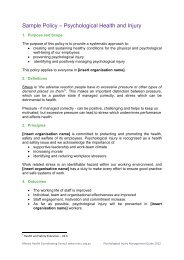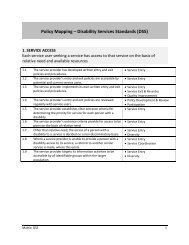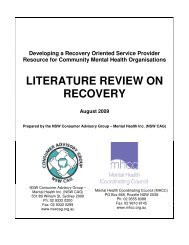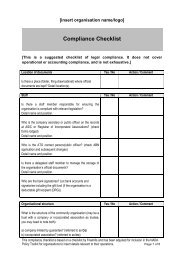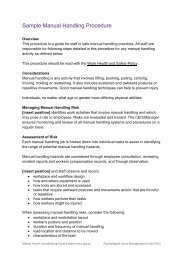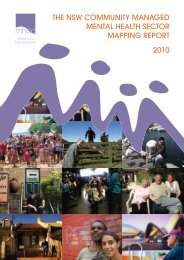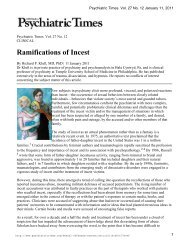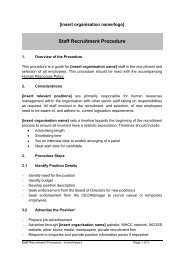Recovery Oriented Supervision Reflection Form - The MHCC Policy ...
Recovery Oriented Supervision Reflection Form - The MHCC Policy ...
Recovery Oriented Supervision Reflection Form - The MHCC Policy ...
You also want an ePaper? Increase the reach of your titles
YUMPU automatically turns print PDFs into web optimized ePapers that Google loves.
Template 7<br />
<strong>Recovery</strong>-<strong>Oriented</strong> Practice <strong>Supervision</strong>: <strong>Reflection</strong> <strong>Form</strong><br />
Available: <strong>MHCC</strong> <strong>Policy</strong> Resource, 2012)<br />
[insert organisation name/logo]<br />
Please use this form as a prompt to reflection before each supervision meeting.<br />
Where possible discuss it in supervision with your supervisor.<br />
1. Personal reflection on self-awareness<br />
1.1 Reflect on your own awareness of:<br />
1.1.1 your beliefs and how your family of origin, cultural and religious<br />
background impact on your judgment<br />
1.1.2 your capabilities<br />
1.1.3 your skills and knowledge<br />
1.1.4 your thoughts and emotions<br />
1.2 What are your blind spots Are you aware of them How challenging is it to<br />
engage with these blind spots<br />
2. <strong>The</strong> Johari Window<br />
One well known framework that encompasses the notion of becoming self -aware in<br />
practice is the Johari window.<br />
In the diagram self -awareness is expanded as we take the risk of self- disclosing<br />
some ‘hidden areas’ and by being receptive to feedback from others about our ‘blind<br />
spots’.<br />
[For this level of self-disclosure to occur, certain boundaries need to be in place to ensure the safety and<br />
trust of the supervisee. It is essential that these boundaries are discussed in the first session of<br />
supervision as part of the supervision agreement].<br />
Practice <strong>Supervision</strong> Template 7<br />
61
3. Think about the people you provide services for. How much do you know<br />
their values, treatment preferences, strengths and goals<br />
Be concrete – think about specific people:<br />
3.1 When do you ask, and when do you not ask, questions about values, treatment<br />
preferences, strengths and goals<br />
3.2 Think about the people for whom you do know these things, and those you don’t.<br />
How do these two groups of people differ<br />
3.3 You might consider characteristics like gender, ethnicity, working alliance, or the<br />
time you have known the person.<br />
3.4 How do your own characteristics impact on the working alliance with a particular<br />
person<br />
Practice <strong>Supervision</strong> Template 7<br />
62
4. How much is your work with people orientated around supporting their<br />
goals and using approaches of their choosing Think about the support<br />
you provide a person you are working with:<br />
4.1 How many of the goals came from the person themselves<br />
4.2 Is your work focused on approach goals (making positive things happen) or<br />
avoidance goals (avoiding negative things from happening)<br />
4.3 How do you impact on the goals<br />
4.4 Are there ways in which you could support the person to do more for<br />
themselves<br />
4.5 How do the person’s values and treatment preferences inform their support<br />
plan<br />
4.6 How do your values, beliefs impact on your interaction<br />
4.7 What is your reaction to goals in complete opposition to your own values<br />
4.8 How is the support plan amplifying their strengths<br />
Practice <strong>Supervision</strong> Template 7<br />
63
4.9 What would you say are your strengths<br />
4.10 How much does the relationship influence the recovery of the person you work<br />
with<br />
4.11 How difficult do you find it to discuss, in supervision, negative/ positive outcomes<br />
with the people you support<br />
References<br />
Bird V, Leamy M, Le Boutillier C, Williams J, Slade M (2011) REFOCUS: Promoting recovery<br />
in community mental health services, London: Rethink.<br />
Chapman, A (2003). Johari Window Model.<br />
http://www.businessballs.com/johariwindowmodeldiagram.pdf Accessed 2 nd<br />
November, 2011.<br />
Practice <strong>Supervision</strong> Template 7<br />
64



